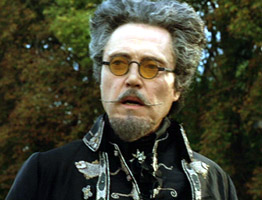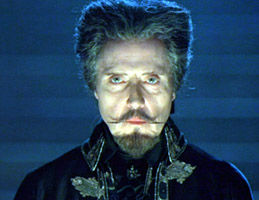|
 |
This interpretation was not Hilary's decision.
The screenwriter saddled Swank with significant fictional changes from a
much more interesting truth. The screen Jeanne was sanitized and
romanticized. The real Jeanne was not a wronged aristocrat whose brave
example helped provide a rallying point to
lead the country toward a more glorious tomorrow. She was a poor woman
from Champagne who may have fabricated her Valois lineage as part of her grand
scheme to make out in society. She was a she-wolf trying to claw her way
into the pack, willing to do whatever was necessary to get ahead, having
nothing to lose.
Columbia Encyclopedia Entry
A detailed
account of the story
Perhaps the strangest decision made by the filmmakers
was to play most of the story with straight-faced sincerity, as soapy
drama. There were many components to create a great farce. Some
farcical moments played out perfectly.
|
DVD info from Amazon
• Commentary
by Charles Shyer
• Theatrical trailer(s)
• 2 Documentaries: The Affair of the Necklace: The Making of
a Scandal and Designing Affair
• Additional Scenes
• Gag Reel
• Cast/ Crew Highlights
• Widescreen anamorphic format, 2.35
|
|
- The duped Cardinal's ego was so great that even
though he knew he was being duped, he assumed the lie must have been
something completely different - surely they were hiding the fact
that the Queen is in love with him!
- And the always-entertaining Christopher Walken is hilarious as Cagliostro,
the ultimate scam artist. When Cagliostro was acquitted because of
insufficient evidence - although, as we saw with our own eyes, he
was guilty as sin - he solemnly thanked the parliament for a just
and wise decision.
The script shone in those comical moments - how many
somber historical dramas include a gag reel on the DVD? - but the
humor inevitably gave way to some sentimentalized narration and
further romantic embellishments, stirring speeches, and swelling
music.
The film also burdened the American actors with that
most tiresome of screen conventions which says that in order to play an
18th century French person, one must do so with a standard RSC 20th
century English accent. We must believe that 20th century British
speech is much more representative of 18th century French speech
than Swank's natural accent would have been. Unfortunately, other
people's belief in that dubious logic gave her one more unnecessary
challenge, and her success was - well, sporadic. |
The
Critics Vote
General UK consensus: one
star.
Daily
Mail 0/10, Daily Telegraph 4/10, The Guardian 2/10, The
Times 3/10, Evening Standard 1/10, The Express 4/10, BBC 2/5
|
The People
Vote ...
- IMDB summary.
IMDb voters score it 5.7/10. Guardian voters 4.1/10
- with their dollars: a massive failure.
Budget unknown, but must have been substantial. It
never reached more than 40 screens, and grossed less than a
half million dollars in the USA
|
| IMDb
guideline: 7.5 usually indicates a level of
excellence, about like three and a half stars
from the critics. 6.0 usually indicates lukewarm
watchability, about like two and a half stars
from the critics. The fives are generally not
worthwhile unless they are really your kind of
material, about like two stars from the critics.
Films under five are generally awful even if you
like that kind of film, equivalent to about one
and a half stars from the critics or less,
depending on just how far below five the rating
is. My own
guideline: A means the movie is so good it
will appeal to you even if you hate the genre. B means the movie is not
good enough to win you over if you hate the
genre, but is good enough to do so if you have an
open mind about this type of film. C means it will only
appeal to genre addicts, and has no crossover
appeal. D means you'll hate it even if you
like the genre. E means that you'll hate it even if
you love the genre. F means that the film is not only
unappealing across-the-board, but technically
inept as well.
Based on this description, this
film is a C-. Good production values.
Sincere effort, but tedious and shallow.
|
|


